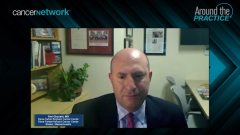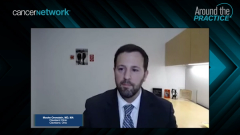
Patient Case 1: A 65-Year-Old Man With RCC
Toni Choueiri, MD, introduces the first patient case: a 65-year-old man with advanced-stage renal cell carcinoma.
Episodes in this series

Toni Choueiri, MD: So, let's move now quickly into a patient case one please.
Toni Choueiri, MD: This is a 65 year old man that present with a 3-month history of fatigue, lower back pain, and unintentional weight loss. Past medical history, significant for hypertension controlled with medication. Again, 65, gets a CT and that CT showed a 6.5-centimeter renal mass but there was also para-aortic lymph node involvement, as well as heterogeneous enhanced lesions in the liver suggestive of metastases. The patient gets a left radical nephrectomy that showed clear cell RCC, Fuhrman grade four with sarcomatoid feature. Karnofsky performance status around 75, 80%. And overall, if we look at the risk criteria such as the IMDC risk score, the patient had at least three risk factor which make this patient IMDC poor risk. So, let's jump, next slide. So, all of us, our friend in the audience, what's your favorite or what's your choice here, the first-line treatment for this patient? A, ipi/nivo [ipilimumab/nivolumab], B, axi/pembro [axitinib/pembrolizumab], C, single agent cabozantinib, D, cabozantinib plus nivolumab, and E, len plus pembrolizumab? Your answers please.
Toni Choueiri, MD: Interesting. Let's go through this. So, almost 43%, ipi/nivo [ipilimumab/nivolumab]. Axi/pembro [axitinib/pembrolizumab], 14%. Cabo [cabozantinib] single agent, 7%. These are changing. Let me see. 17% cabo/nivo [cabozantinib/nivolumab]. So, this is a cross. Beside ipi/nivo [ipilimumab/nivolumab], around 40, mid-40%, the rest is somewhat equally distributed except for single agent cabozantinib which still had people. Let's see that evolve over time. Interesting. Same structure, VEGF/IO, 15%. Single digit with cabo [cabozantinib], understandably. And ipi/nivo [ipilimumab/nivolumab]46%. Interesting. Well, Dr. Zhang, do you agree with this? What would be your front-line option and do you agree with this poll?
Tian Zhang, MD, MHS: Yeah, you know what? When I'm looking at first line options, certainly all of these are good treatments and the immunotherapy-based treatments are certainly what I go to for IMDC intermediate and poor risk disease. But I'm also, I'm always thinking about tumor burden and how quickly I need to achieve disease control. So, that is my deal breaker, if you will, in terms of selecting a VEGF/TKI, which has better disease control benefit I think, combination versus ipi/nivo [ipilimumab/nivolumab]. I think in this case where we are presented with just the location of his masses, not anything that's seemingly symptomatic and I need disease control now, I think ipi/nivo [ipilimumab/nivolumab] is a very good regimen and certainly one that I would prioritize in terms of picking for the patient. So, I certainly agree with the audience for this poll.
Toni Choueiri, MD: Dr. Orenstein, do you agree? Is there anything else maybe make you pick a VEGF/IO combination and which one?
Moshe Orenstein, MD, MA: It does seem like the audience is split half and half, VEGF/IO although they differ on ipi/nivo [ipilimumab/nivolumab]. When I look at a patient, again, I would also pick an IO based combination but what I'm struck by in this case is that it does seem like the patient is symptomatic. There is fatigue, there's lower back pain, there's unintentional weight loss. It does in some way seem to me like we do have to go with agents that are going to have a higher chance of a response right now. Not knowing how quickly the KPS is going to dip from 75 to 50 if we give an IO/IO combination. In other words, with the IO/TKIs, the response rates are higher. With the IO/IO they're a little bit lower and I worry about this patient that he might need a response right now and I'd probably go IO/TKI. The one thing I would point out is in one of the bullet points it mentioned that there was no sarcomatoid features. I think if this patient did have sarcomatoid features, I may have been a little bit more tempted to go with an IO/IO just based on the data from sarcomatoid in IO/IO which seems really active in that subset. But for this patient who seems to need a response now, I'm more inclined to go with an IO/TKI combination.
Toni Choueiri, MD: Dr. Braun, direct question to you, what situation if this case had would you do single agent TKI?
David A. Braun, MD, PhD: That's a great question. I think it's hard to envision a particular situation outside of really a strong contraindication to getting IO based therapy. So, if someone has severe autoimmune disease, things of that nature where I'd be really nervous about giving anti-PD-1 therapy, that's probably the situation I'd be limited to in this case for giving single agent TKI. The people I still consider it is those with indolent biology in terms of their disease, favorable risk. Ones who could often go through a period of active surveillance but at some point, need some therapy. That situation, at least a single agent TKI is a reasonable thing to consider. But I think for a patient like this who's at risk of rapid progression, rapid clinical deterioration, I would go with an upfront combination-based therapy.
This transcript has been edited for clarity.
Newsletter
Stay up to date on recent advances in the multidisciplinary approach to cancer.







































